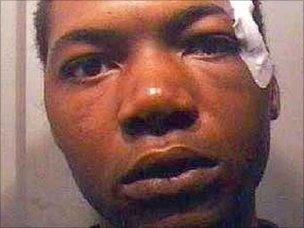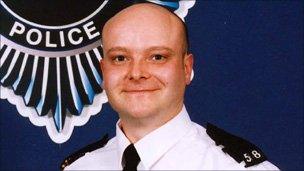Luton stab murder of Pc Jon Henry 'preventable'
- Published

Ikechukwu Tennyson Obih was diagnosed with paranoid schizophrenia in 2004
The death of a police officer killed by a man with paranoid schizophrenia could have been prevented if he had been treated suitably, a report has found.
NHS East of England commissioned the investigation into the care of Ikechukwu Tennyson Obih, who stabbed Bedfordshire Pc Jon Henry in 2007.
Obih was convicted of murder and jailed for life at Luton Crown Court.
The report said the closure of an early intervention service that Obih had used was the starting point of the case.
Pc Henry, 36, was stabbed twice in the chest as he tried to arrest Obih in Luton on 11 June 2007.
He was one of four officers called to George Street, Luton, after window cleaner Stephen Chamberlain was stabbed.
Obih was under the care of the former Bedfordshire and Luton Mental Health and Social Care Partnership NHS Trust.
In the report by Verita, which was commissioned by NHS East of England, author Lucy Scott-Moncrieff said there were a series of "management and clinical failings" starting from the decision to close the early intervention service to save money.
She said: "The cumulative effect of these failings was that at the time of the incident Mr Obih's illness was untreated and his well-being was effectively unmonitored.
"We find therefore that the incident might not have occurred if he had been suitably treated and might therefore have been prevented."
Ms Scott-Moncrieff said Obih, who was diagnosed with schizophrenia in June 2004, had no history of violence.
Between February and July 2006 he was an in-patient at a recovery unit in Luton, then moved into his own accommodation under the care of the Luton Early Intervention Team.
In September 2006 the early intervention service was closed.
Obih was then transferred to Luton South East Community Mental Health Team where he received "considerably less" support and was seen 16 times in four months, compared to 36 times in two months with the early intervention team, the report found.
After this, he stopped attending a day care service, and in December 2006 it was found he had stopped taking his antiphsychotic medication.
Ms Scott-Moncrieff said the investigation found senior trust managers failed to ensure the agreed transfer process between the early intervention service and other services was followed.

Pc Jon Henry was called to respond to an attack on a window cleaner
The community mental health team could not offer Obih the level of care he was receiving previously and "could and should have done more for him", she said.
She added: "In the current economic climate, it is likely that other trusts may find themselves in a similar position."
Claire Lawton, associate medical director of NHS England, said: "We wish to ensure that the learning from this case can be shared as widely as possible to do everything in our power to prevent such a thing happening in the future.
"The independent report provides recommendations for specific actions to build on the improvements already made in mental health services in Luton. Action plans have been put in place by the trust and PCT and significant progress has already been made."
Marjorie Wallace, chief executive of the mental health charity Sane, said lessons had not been learned from previous cases.
"There seems to be no excuse for the failure of community care teams, who ignored every red alert warning that Tennyson Obih's mental state had deteriorated to a point where he posed a serious risk.
"Too often we are hearing about what can only be called 'wing and a prayer' psychiatric care, where the complex and sometimes confused arrangements between community teams fail to protect both the patient and the public.
"It is clear that lessons have not been learned from the hundreds of similar findings from independent inquiries that have been conducted into cases such as these."
In a statement Susan Doherty, Pc Henry's sister, said: "If there had not been cost cutting measures and neglect of the treatment provided to Mr Obih then perhaps we would not be here today with old wounds being opened.
"We would just like this to be the final closure of the whole traumatic and devastating episode and for his parents and siblings and Jonathan's widow and daughter.
"The loss never gets less but we are able to deal with the grief on a daily basis better over the course of time."